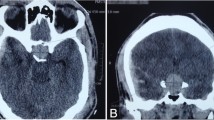Abstract
In a 12-yr-old boy growth arrest occurred after severe head trauma. Evaluation of pituitary endocrine function revealed isolated growth hormone (GH) deficiency. Lack of GH response to GH-releasing factor indicated that the responsible lesion was most likely to be localized in the pituitary gland. GH substitution resulted in biochemical (somatomedin increase) and clinical (catch up growth) response.
Similar content being viewed by others
References
Tanner J.M., Whitehouse R.H., Takaishi M. Standards from birth to maturity for height, weight, height velocity and weight velocity: british children. Arch. Dis. Child. 41: 454 and 613, 1966.
Greulich W.W., Pyle S.I. Radiographic atlas of skeletal development of hand and wrist, 2nd ed. Stanford University Press, California, 1959.
Frisch H. Wachstumshormon-Mangel bei Kindern. Beurteilung hypophysärer Funktionstests. Therapie und Verlaufskontrolle. Facultas Verlag, Wien, 1983.
Barreca T., Perria C., Sannia A., Magnani G., Rolandi E. Evaluation of anterior pituitary function in patients with posttraumatic diabetes insipidus. J. Clin. Endocrinol. Metab. 51: 1279, 1980.
Israel S.L., Conston A.S. Unrecognized pituitary necrosis (Sheehan’s syndrome): a cause of sudden death. J.A.M.A. 148: 189, 1952.
Klachka D.M., Winer N., Burns T.W., White J.E. Traumatic hypopituitarism occurring before puberty: survival 35 years untreated. J. Clin. Endocrinol. Metab. 28: 1768, 1968.
Landau H. Pituitary insufficiency after head injury. Isr.J. Med. Sci. 14: 785, 1978.
Porter R.J., Miller R.A. Diabetes insipidus following closed head injury. J. Neurol. Neurosurg. Psychiatry 11: 258, 1948.
Sheehan H.L, Murdoch R. Post-partum necrosis of the anterior pituitary: pathological and clinical aspects. J. Obstet. Gynaecol. Br. Emp. 45: 456, 1938.
Paxson C.L., Brown DR. Posttraumatic anterior hypopituitarism. Pediatrics 57: 893, 1975.
Fink E.B. Diabetes insipidus: a clinical review and analysis of necropsy reports. Arch. Pathol. 6: 102, 1928.
Goldman K.P., Jacos A. Anterior and posterior pituitary failure after head injury: report of two cases. J. Clin. Endocrinol. Metab. 5: 119, 1945.
Holbourn A.H.S. Mechanics of head injuries. Lancet 2: 438, 1943.
Valenta L.J., De Feo D. Posttraumatic hypopituitarism due to a hypothalamic lesion. Am. J. Med. 68: 614, 1980.
Crompton M.R. Hypothalamic lesions following closed head injury. Brain 94: 165, 1971.
Author information
Authors and Affiliations
Rights and permissions
About this article
Cite this article
Eichler, I., Frisch, H., Eichler, H.G. et al. Isolated growth hormone deficiency after severe head trauma. J Endocrinol Invest 11, 409–411 (1988). https://doi.org/10.1007/BF03349069
Received:
Accepted:
Published:
Issue Date:
DOI: https://doi.org/10.1007/BF03349069



